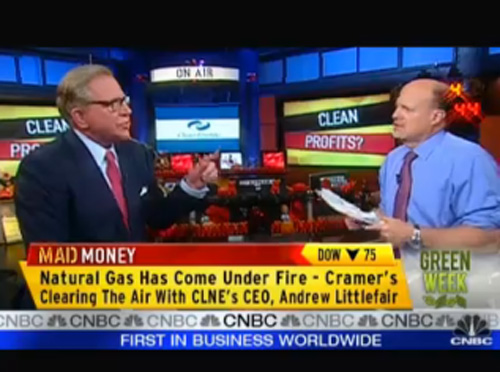Is a logistics world based more on natural gas than diesel fuel closer to a reality than many realize?
Maybe so.
Clean Energy Fuels is company building out a network of natural gas filling stations that will be needed by the thousands if and when natural gas-powered vehicles (trucks and cars) really do start to gain critical mass.
CEO Andrew Littlefair had a very interesting discussion on this topic with noted financial personality Jim Cramer on CNBC's Mad Money show this week, which we summarize here.
Cramer started by noting that even though natural gas produces far less carbon emissions than oil-based fuels do, "many environmentalists see it as an enemy - they hate it. They were about the drilling process, they worry about the groundwater, even though there hasn't been a single document case of that happening."
Sierra Club member Cramer added that "Natural gas may not be perfect, but it is certainly is "greener" by about 30% than gasoline." He also said that right now, natural gas is about $1.50 per gallon equivalent cheaper than gas and diesel fuels - a significant potential savings for both consumers and shippers/truckers.
"Throw in the fact that natural gas is abundantly available domestically, and you have a cheaper, cleaner fuel that that puts the US much closer to energy self-sufficiency and which would create thousands of good paying jobs."
Littlefair said that his company is now talking more directly to the shipping industry to try to move the natural gas initiate forward, rather than just working the political angle.
"We've signed NDAs [non-disclosure agreements] with about 40 shipping companies," he said, relatively to coordinating efforts to make the change in truck fleets from diesel to natural gas. "They want to be sustainable, but they can save $1.50 a gallon, a the average truck is using 20,000 gallons per year."
We're guessing, but the NDAs are likely related to commitments to build natural gas filling stations if a given company goes natural gas.
Littlefair also said the extra cost to make natural gas engines for Class 8 trucks is coming down. Several years ago, when legendary energy investor T. Boone Pickens announced his "Pickens Plan," the cost delta was more like $65,000, which Pickens wants to extend as a tax credit or subsidy to jumpstart the change from diesel to natural gas. Before that, it was more like a $100,000 difference.

Clean Energy CEO Andrew Littlefair
with CBNC's Jim Cramer
Now, it's down to just a $35,000 delta, which coincidentally enough right now would result in about a one year payback for truckers/shippers (20,000 per year times $1.50 per gallon). Though that equation can change if oil prices drop or nat gas prices rise, it still seems likely to be a favorable financial play for a long time.
Littlefair said he thinks the cost difference can go even lower than that.
"Except for the fuel delivery system, that might cost a little bit more - you know, the "thermos bottle" versus a diesel tank - I think eventually with scale we will get it down to around $10-15,000 difference."
Littlefair said there is a bill currently pending in the US House, and that action is also likely in the Senate soon. The House bill (H.R. 1380) has 186 cosponsors and enjoys broad bipartisan support.
Among other subsidies, the bill specifically calls for infrastructure credits to help defray the expense of installing fueling stations, along with a credit to reimburse up to $7,500 for passenger trucks and $64,000 for commercial trucks that run on natural gas fuels.
Littlefair says he actually believes a Senate bill will get passed first, which will then drive action in the House. Whether President Obama would sign such a bill is unclear, though Littlefair thinks he would.
"I don't think we have to have this bill, but it will make the switch go faster," Littlefair said.
Littlefair discussed the impact such a change would have on the US transportation industry - and fuel independence. He said that if just 150,000 out of the 3 million or so Class 8 trucks that operate in the US went to natural gas, that would replace 3 billion gallons of diesel fuel currently used.
Cramer in turn noted that even at the level, it would give the US a lot of leverage over OPEC vis-a-vis oil prices.
In its just released quarterly earnings call, Clean Energy said it planned to build a 150 filling stations in 2012 - almost one every other day. That total will be roughly split between "highway" stations and others going into airports, trash truck fleet areas and other niches. That's on top of the 70 stations the company expects to have by the end of this year.
The question is: if Clean Energy builds them, will the truckers and regular drivers come?
Cramer noted that some have said there is resistance to regular cars using natural gas because the tank has often been placed in the trunk of the cars, limiting the storage room. But Littlefair said increasingly European car companies have engineered the tank underneath the cars, eliminating that objection, and that Italy's Fiat sold some 150,000 natural gas cars last year.
"We really have to do this, don't we?" Cramer concluded.
Do you think we may actually see a natural gas revolution in logistics very soon? Why or why not? Let us know your thoughts at the Feedback button below.

TheGreenSupplyChain.com is now Twittering! Follow us at www.twitter.com/greenscm |